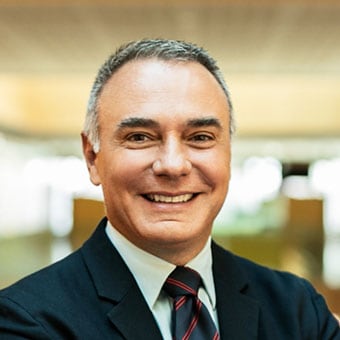Today, society is driven by an unprecedented speed of innovation—far outpacing previous eras, such as the Industrial Revolution.
Over the past 30 years, new products have advanced from conception to launch in ever-shorter timeframes.
This sudden acceleration has increasingly been driven by different generations working together.
On the one hand, you have the older generations with their vast knowledge base, business acumen, and experience; on the other, younger generations are entering the workplace armed with new skills, fresh ideas, and a fearless approach.
Without question, it’s a blend with the potential to create formidable business solutions when supercharged by inclusive, open, and forward-thinking leadership.
Indeed, studies show that multigenerational workforces bursting with diverse and complementary talents are key to business, economic, and social growth. They can also create environments that are more fun to work in.
Massimo Andolina,
President, Europe Region, Philip Morris International
Working together to maximize impact
Of course, a young digital native raised on a diet of technology and its constant evolutions may have very different business, social, and cultural references to a long-serving stalwart of business.
For instance, I have observed that Gen Z often thrive on shifting priorities and multitasking, whereas Gen X tend to value stability and focus. When forming a team, being mindful of what drives each group and ensuring these differences are equally valued enhances a leader’s chances of reaping an explosive mix of strengths—power-driving innovation and progress.
This isn’t simply a box to tick; it’s a business imperative.
For businesses to successfully meet the evolving needs of the consumers we’re serving, it’s critical we build workforces reflective of the world’s diversity—be it age, gender, ethnicity, sexual orientation, or any other characteristic.
Therefore, by enabling different age groups to collaborate harmoniously, we can maximize our positive impact in addressing some of the world’s most pressing challenges.
This is critical for a company like mine. Only by harnessing the diverse voices, opinions, and range of skillsets amongst our 82,700 employees can we deliver on our vision of making cigarettes obsolete.
Collective wisdom
Tapping into the collective wisdom of multiple generations helps us to navigate the complexities of modern business.
I’ve been privileged to witness many examples of this at PMI. For example, a team in our Japanese market leveraged artificial intelligence to significantly enhance our product design process.
By merging market insights with technological expertise, the team—including both seasoned marketers and tech-savvy younger professionals—devised groundbreaking solutions that transcended traditional boundaries, advancing our commitment to innovation in the process.
This form of expertise-sharing is pivotal in fostering an environment where all voices are heard and valued at PMI—and, crucially, where everyone feels able to perform at their best.
By actively encouraging input from all team members and creating a culture of psychological safety, PMI’s leaders can unlock the full potential of our workforce—and, in doing so, bring our ambitions into sharper focus.
Tapping into the collective wisdom of multiple generations helps us to navigate the complexities of modern business.
Learning to unlearn
A common roadblock when generations are brought together is a reluctance—or refusal—to change approach or adapt to new ideas and ways of working, often through fear of stepping outside long-established comfort zones.
This is dangerous for any business required to keep pace in a landscape underdoing such radical and regular reconstruction.
So, the importance of challenging conventional wisdom within a company like PMI can’t be underestimated.
I saw the benefits of this open-mindedness in my previous role—as Senior Vice President of Operations—when we revolutionized supply chain management through the integration of predictive analytics and machine learning.
This was only brought to fruition because senior leaders have adopted a mindset of continuous learning—and unlearning—adapting to changing market dynamics and thereby driving innovation at every level.
Another example is the cross-functional team we formed during the COVID-19 crisis, which I was part of.
This team, consisting of people from various age groups and backgrounds, united under a common mission to support colleagues and navigate unprecedented challenges specific to PMI’s operations.
It proved that by fostering a sense of purpose and inclusivity, we can cultivate diverse but cohesive teams capable of tackling complex problems with agility, resilience, and pioneering spirit.
I believe that diverse teams—by bringing together different backgrounds, viewpoints, and ways of working—are the most agile, as they have experience of, and solutions for, a far greater range of business scenarios than a team composed of individuals who all think the same.
Empowering future leaders
To ensure these strengths are built upon today and in future, we must invest in the development of our next generation of leaders.
Mentorship programs and leadership development initiatives are among the tools at PMI that help bridge the gap between generations and nurture a culture of collaboration and knowledge-sharing.
By empowering young talent and providing opportunities for growth, we can ensure seamless transitions of all levels of leadership and drive sustained innovation in alignment with our smoke-free vision.
Providing targeted training and access to digital courses equips employees with the skills and knowledge needed to thrive in a world that will look far different in just a few years’ time to the one we live in today.
Success in an accelerating world
As companies negotiate increasingly complex and dynamic tides of change, I believe the power of cross-generational collaboration will emerge as a cornerstone of progress.
With inclusive leadership, a commitment to continuous learning, and a focus on empowering future leaders at the fore, PMI will build ever more resilient, collaborative, and creative solution-orientated teams that are primed for success in the digital age.








